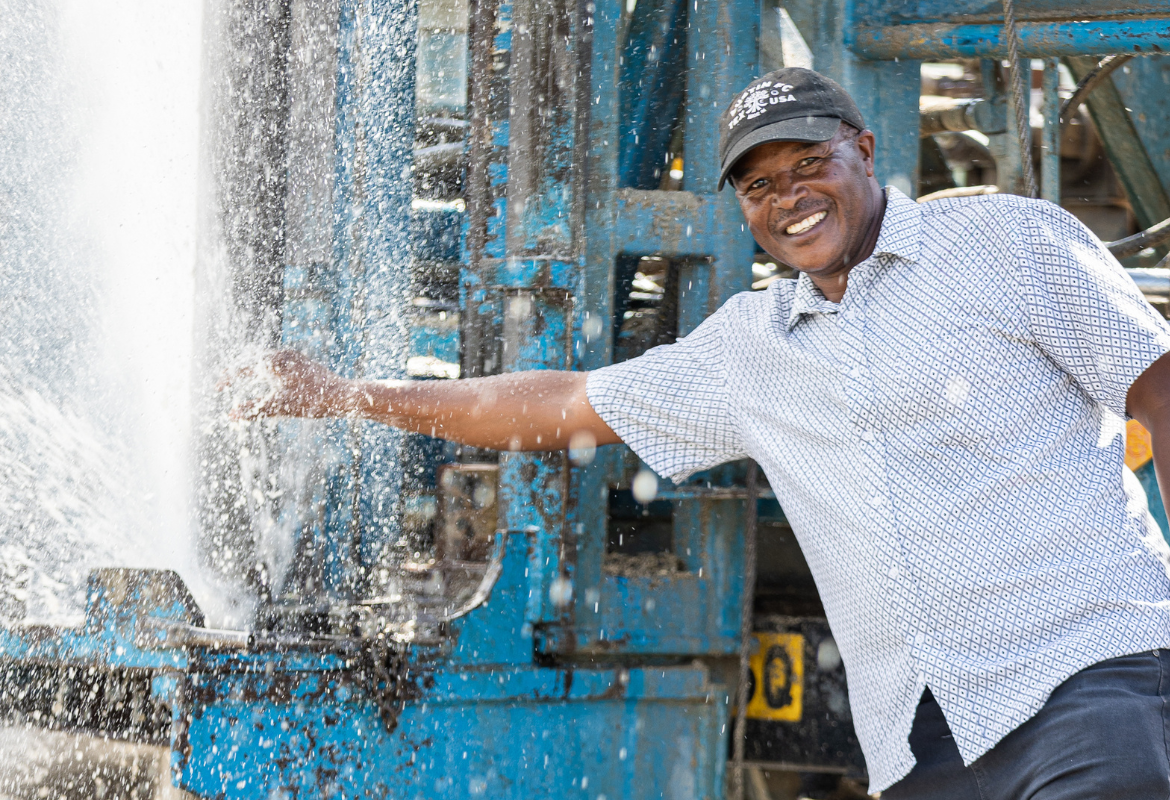September 25, 2025
When the Drill Ran Dry: What We Learned from Our First and Only Dry Well
In 2021, after more than a decade of drilling reliable water wells across East Africa, Well Aware faced something we had never experienced before: a dry borehole.
And it was not just any project. This was in the home community of our Kenya Director of Projects, Mike. I met Mike on my very first trip to Kenya in 2010, when he was my driver. Within a couple of years, he became our first paid employee. Today, he is the glue that holds our Kenya team together, respected and loved by the communities we serve and by so many of our donors who have met him over the years. When Mike comes to our Austin galas, he is instantly surrounded by friends.
Mike’s community lies east of Nairobi, across the dry, rugged stretches of Makueni and Machakos counties. The land is beautiful in its own way, with rolling hills and acacia trees scattered under a wide blue sky, but it is also harsh. Rainfall is unpredictable, rivers vanish into dust for months at a time, and the groundwater, if it exists at all, is trapped deep under stubborn layers of rock. Generations have endured failed aid projects: hand pumps that broke and were left to rust, shallow wells that collapsed within months, and water tanks delivered without a source to fill them. The need is immense, and still today, large populations here lack a safe and reliable source of water.
We had avoided drilling here for years because we knew the geology was risky. But when new studies emerged, along with a recently successful borehole nearby, we began to hope again. It finally felt like the right moment to try. The project was funded by our friends at Spectrum Brands, John Fox and Janette Ruark, who had both traveled with Well Aware and knew Mike well. They were not with us in person, but they were following every update from home, waiting to celebrate alongside us.
The first day of drilling was slow. The bit ground through layers of hard rock, inch by inch. On the second day, progress was just as slow, and the air around the drill site began to feel heavier. By the third day, our optimism had begun to thin. We had been doing this work for eleven years without ever hitting a dry well, and somewhere along the way, we had started to believe that would always be true.
By the fourth day, reality began to settle in. The drillers pushed on, but the rock was unyielding. We spoke to other drillers across Kenya, consulted with hydrogeologists in the United States, and even explored hydrofracking in the hope of reaching water through fractured stone. Every hour brought more dust, more heat, and fewer reasons to believe we might succeed.
By the end of the fifth day, we had exhausted every option. Mike was there on site, standing quietly near the rig as the sun began to sink. He already knew what we had to tell him, but saying the words out loud was still one of the hardest moments of my career.
After that, we had to call John and Janette. I had never cried in front of donors before, but that night I did. They were heartbroken, but also incredibly gracious, telling us they knew we had done everything possible. On that same call, we made a promise together. If we could not bring groundwater to Mike’s community, we would find another way to bring its children the water they needed.
Over the next two years, we built rainwater harvesting systems at seven primary schools in and around Mike’s home community. Today, thousands of children drink clean water every day because of those systems.
That dry well changed us. It launched our deeper groundwater investigation program and helped us create the detailed database we now use to identify areas where drilling is simply not possible. It also strengthened our resolve to teach donors that rainwater systems are not a lesser option. In much of East Africa, drilling will never succeed, and in these places, rainwater harvesting is not the “second-best” choice. It is the only choice.
Some people still picture a water well as the ultimate solution, but this experience taught us something important. What matters is not the method, but the result. Clean, reliable water, in whatever form is possible, is what transforms lives.
Our dry well in Mike’s community will always be one of our most painful memories. Yet it is also one of our most meaningful. It reminded us that our work is not about proving we can drill anywhere. It is about ensuring that, no matter the odds, people have the water they need to live and thrive.
